Plextor M5S 256GB Review
by Kristian Vättö on July 18, 2012 3:00 AM ESTInside the M5S
Since the M5S does not include any software discs or 2.5" to 3.5" bracket, the packaging is noticeably smaller than M3's.
There are absolutely no add-ons included. The only contents of the package are the SSD itself and a quick installation guide. It should be noted that not even mounting screws are included, so hopefully your case came with a few.
The chassis at least looks like it's the same as in the M3. The color is a match and both measure in at 9.5mm in height.
The innards have changed quite significantly. The M3 and M3 Pro both had separate thermal pads for each main component (controller, NAND, DRAM), but the M5S only has one thermal pad which is for the controller. This is without a doubt a cost cutting measure. Thermal pads are not really necessary as SSDs don't generate much heat anyway.
The M5S is powered by Marvell's 88SS9174-BLD2 controller, just like the M3 and M3 Pro were too. I was hoping to see Marvell's 88SS9187, but perhaps Plextor is saving that for "M5 Pro". According to Plextor, the M5S does come with a different firmware than the M3 and M3 Pro, although I'm guessing that the M5S firmware was built upon the M3 (Pro) firmware. It's likely that the M5S firmware just adds Micron NAND support.
The only change in hardware appears to be in the NAND department. The M3 and M3 Pro used Toshiba's 24nm Toggle-Mode 2.0 MLC NAND, whereas the M5S is using 25nm ONFi 2.x MLC NAND from Micron. The change in NAND supplier has also resulted in changes in the PCB layout. There are now sixteen NAND packages, eight on each side of the PCB. The M3 and M3 Pro both had only eight NAND packages, regardless of the capacity. The 256GB model we have uses 16GB packages, each consisting of two 8GB dies.
Plextor stuck with Nanya as its DRAM supplier. There are two 256MiB DDR3-1333 SDRAM chips, giving the M5S a total of 512MiB of cache.
The markings on the PCB actually say "M3S". Our unit is a pre-production sample, so that could be the reason but essentially the M5S is just an M3 with ONFi NAND.
Test System
| CPU |
Intel Core i5-2500K running at 3.3GHz (Turbo and EIST enabled) |
| Motherboard |
AsRock Z68 Pro3 |
| Chipset |
Intel Z68 |
| Chipset Drivers |
Intel 9.1.1.1015 + Intel RST 10.2 |
| Memory | G.Skill RipjawsX DDR3-1600 2 x 4GB (9-9-9-24) |
| Video Card |
XFX AMD Radeon HD 6850 XXX (800MHz core clock; 4.2GHz GDDR5 effective) |
| Video Drivers | AMD Catalyst 10.1 |
| Desktop Resolution | 1920 x 1080 |
| OS | Windows 7 x64 |


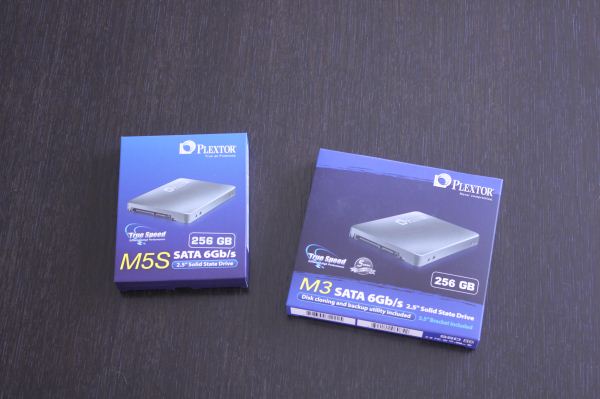
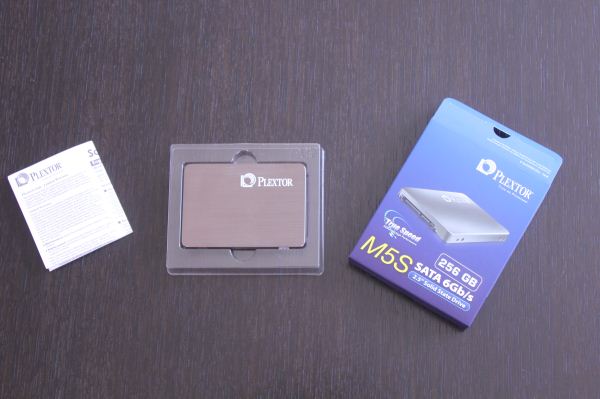
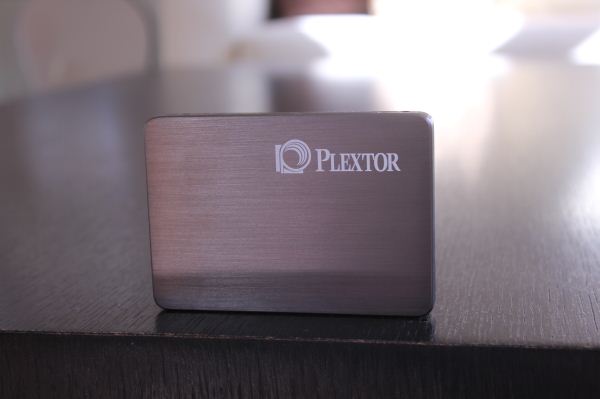
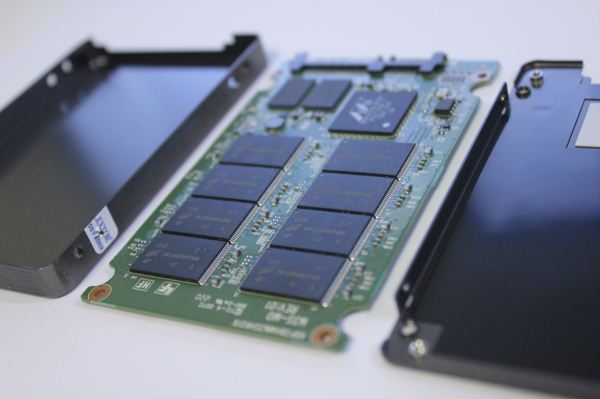
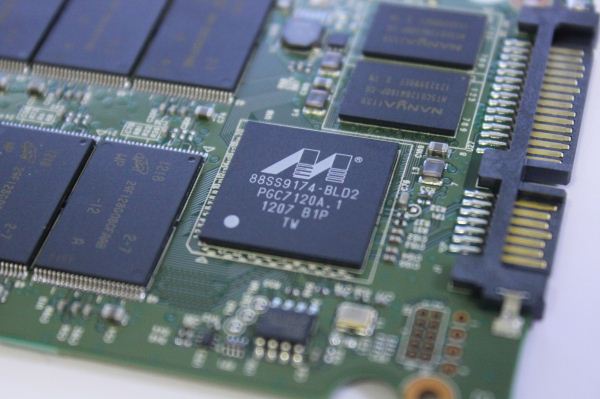
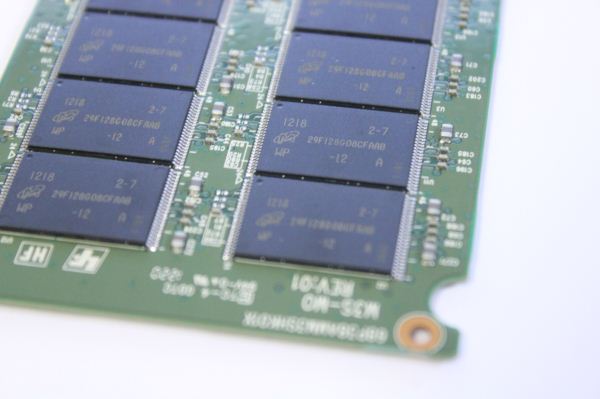
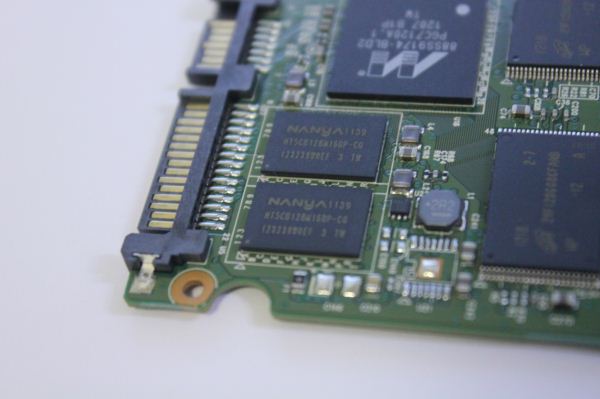
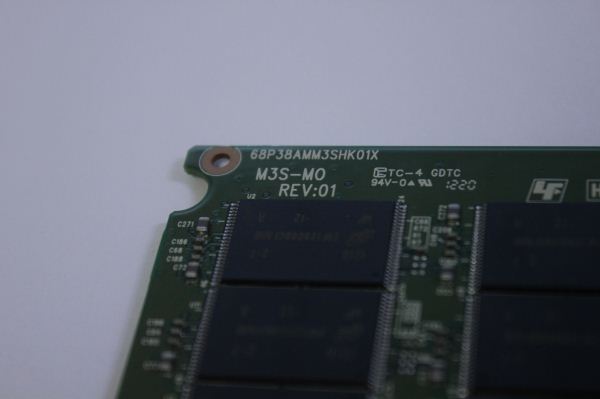








43 Comments
View All Comments
StevoLincolnite - Wednesday, July 18, 2012 - link
Another reason regarding Newegg reviews is, will all happy users post a review? Disgruntled customers are highly likely going to do so.themossie - Wednesday, July 18, 2012 - link
There's a strong selection bias, but this bias should be similar for all SSDs. If you compare the percentage of (dis)satisfied reviews, it's a useful way to compare different SSDs - as long as you don't take the numbers too seriously on their own.The Plextor M3 256GB and 128GB SSDs rate 88% and 90% five eggs respectively, which is exceptionally high. Compare this with the OCZ Vertex 3 120GB (one of the most popular and highest ranking Sandforce drives) at 35% one and two egg reviews and 62% five eggs.
I won't speak for the statistical significance of any of this (especially with the <100 review sample size for the Plextors) but it looks like very few people regretted buying a Plextor, something I like to hear about any product :-)
Zak - Wednesday, July 18, 2012 - link
I've just ordered 128GB and 256GB M3Pros, so I was a little upset when I saw this review of M5 but then it looks like other than higher price and 30MB/s increase I didn't miss much. But I wonder how fast the M5Pro will be.BTW, I don't believe that the current SSDs are significantly more reliable than hard drives (which is a bummer) so the 5 years warranty was the deciding factor for me. Plus, I was always a fan of Plextor products. Two of my older OCZ SSDs died in their second year, after the warranty was over. So I'm more mindful of warranties when buying stuff these days. The recent trend in lowering hard drive warranties is regrettable.
karasaj - Wednesday, July 18, 2012 - link
Statistically speaking, anything above thirty is actually considered "relevant, fairly reliable information"Granted, that might not be entirely true due to the insane selection bias, but since that's also present on all drives it might not matter.
Zak - Wednesday, July 18, 2012 - link
"I checked NewEgg reviews for Plextor's M3 and M3 Pro and only 4.2% of the reviews (189 user reviews in total) were one or two eggs, which usually indicates a serious problem with the drive." -- or serious problem with the reviewer. For example I've see people giving SSDs poor reviews because they didn't run at the advertised speeds over 500MB/s on their SATA 3.0Gbps interfaces, etc.justaviking - Wednesday, July 18, 2012 - link
And then there are people who get the ratings backwards.How many times have you read a glowing review ("I love my new drive!!!") but it has a rating of 1? Either they thought "1" meant excellent, as in "first place," or they forgot to enter a rating when they did their review.
I've seen that on more than one site. Maybe the online retailers should use "3" as their default value.
Kristian Vättö - Wednesday, July 18, 2012 - link
"or serious problem with the reviewer"I first thought you meant me and was like why the attitude. Took me a while to figure out you mean NewEgg reviewers, not me - or at least that's the way I hope it is :-)
I definitely agree with you though.
TrackSmart - Wednesday, July 18, 2012 - link
I strongly disagree that Newegg reviews "mean squat". For items with similar buyers and *hundreds* of reviews, it quickly becomes clear when there is an unacceptably high failure rate for an SSD. Check out OCZ's Petrol series of SSDs for instance: http://www.newegg.com/Product/Product.aspx?Item=N8... Or the Vertex 2: http://www.newegg.com/Product/Product.aspx?Item=20...Certainly, a bad review (1 - 2 eggs) does not equal failure in a 1:1 relationship, but you can bet that the correlation will be high. And highly statistically significant if there are enough reviews, even with self-selection bias.
Would you really buy one of those OCZ Petrol drives to save $20, despite the preponderance of bad reviews? 72% are 1-2 eggs! That's a correlation.
yyrkoon - Saturday, July 21, 2012 - link
I agree with Kristian on this.Personally, I sometimes take newegg reviews more seriously on products like these. Simply, because Anandtech reviews are controlled, and limited by the amount of items they are given.
However, you also have to be able to ascertain the given reviewers ( on newegg ) understanding of technology. Which thankfully is not too hard. You just need to read. Often, you will find that reviewer have very little understanding of what they are buying, if negative reviews are given. Passed that, ignoring the rating system of a given review, and understanding the product your self is a must,
Sometimes, you will find that a negative review has merit. Then all you have to figure out. Is if the problem is something you can live with or not. Simple.
Nickel020 - Wednesday, July 18, 2012 - link
Thank you very much for reviewing the drive. I only skimmed over the review (will read later), but I noticed that the prices in the table on the last page are completely different than what you get when you click on the links.It would also be nice if you were to include European prices as well, I think geizhals.de is a very good indicator of what drives actually sell for in Europe.